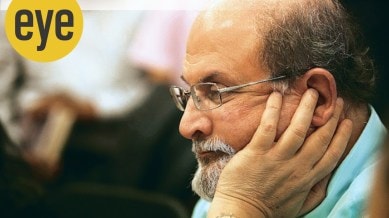In The Eleventh Hour, Salman Rushdie asks: What remains when words fail?
This collection of stories is animated by death — by ghosts, by conversations with dead authors, by meditations on mortality

Our Words Fail Us.” This blunt final sentence of The Eleventh Hour, Rushdie’s latest collection of short stories, might seem an odd coda to his oeuvre. After all, he has poured whole worlds into words, made worlds out of words, and made words do every trick imaginable, sometimes even defy death. Nothing has stood in the way of Rushdie’s words: not the fatwas of Ayatollahs, not the stabbing attempt by Hadi Matar, not even the perennial worry that someone so prolix might eventually run out of things to say.
But how might words fail us? Given Rushdie’s life and literary career, several possibilities present themselves. Words were his indomitable armour, the resource that allowed him to survive. But they also created his greatest vulnerability; language was both his shield and the reason he was susceptible to attack. Perhaps, the failure is simply age: imagination and memory — two of Rushdie’s most potent faculties — beginning to wear thin. Or perhaps, it is that at some point, even a writer who can survive death sentences finds himself at a loss before the brute fact of death itself. This collection, after all, is animated by death — by ghosts, by conversations with dead authors, by meditations on mortality.
Yet, the failure of words may also be a commentary on our age: a world in which insincerity, propaganda and the easy instrumentalisation of language have corroded the medium in which Rushdie has always worked. There is too much language and yet, most of it feels exhausted and exhausting. Or perhaps, language cannot bear the full weight of our experience. Most writers attempt to impose coherence on the world. Rushdie travelled in the opposite direction. His novels thrived on excess — overflowing references, cross-connections, puns, strange juxtapositions, incommensurable worlds jostling on every street. What resulted was a cultivated incoherence, a revelry in the overflow that fundamentalism, with its hunger for purity and singularity, could not abide. But perhaps, there comes a point when even this exuberant excess cannot be contained by words. Perhaps, words fail because the experience they are meant to capture has finally become beyond capture.
It is hard not to think of these matters when reading this quintet of stories, which are leisurely, ruminative and genial by Rushdie’s standards. ‘In the South’ is about two bickering old men for whom “death and life are adjacent verandas”. It has the trademark Rushdie zingers — deep truths cloaked in casual levity. Junior tells Senior, “You look like a man who is only waiting to die.” The reply comes quick: “That is better than looking, as you do, like a man who is still waiting to live.”
‘Late’ follows the ghost of a Cambridge don who enlists a lonely student, Rosa, in a plot, ghosts tackling all kinds of intriguing shadows of the past. It is more philosophical than one might expect from Rushdie: “To be free is to abandon the idea of being good” is the thought that fuels this historical psychodrama.
‘Oklahoma’ is a layered story within a story: a young writer tries to figure out how his literary hero ended his life and, in the process, writes his own. ‘The Old Man in the Piazza’ conjures a vanished world of the town square, where people come to dispute but increasingly require more arbitration, as the very rules of argument fade. “It is unclear what we must do now. What will become of us?” the town wonders, as the old man, the mediating sage, retreats into insignificance.
But it is ‘Kahani’, the second story in the quintet, that contains most of the Rushdie of old: stylistic excess, wordplay, atrocious puns, including one about a beta version of software and the Hindi beta. Ostensibly, it is about Chandini, a musical prodigy equally at home in Indian and Western traditions, whose art is both a blessing and a curse, and about her ghostly mathematician father and her mother. But the story’s deeper theme is that we create by believing. As one character intones, God, Nation and Money cease to exist if we stop believing in them; he arbitrarily chooses to believe in two of the three.
The title ‘Kahani’ is not just “story”; it is Bombay itself, renamed as not just a story but story itself. In a wonderful conceit, Rushdie imagines that instead of renaming colonial-era streets after third-rate politicians, Bombay had renamed them after stories or storytellers. The list is a typical Rushdie mélange, placing gods, heroes, fictional characters and writers on the same plane: “Nissim Ezekiel Marg, Sholay Chowk, Valmiki Drive, Amar Akbar Anthony Road, Vyasa Vellard, Tendulkar (Vijay, we suppose, not Sachin) Terrace, Malgudi Circle, sprang into my head.”
Words may fail us. Our experience, our sense of self, even our democracy. But we remain, still, the best stories we tell ourselves. Salman Rushdie Road toh banta hai for Bombay’s most famous storyteller.
The writer is contributing editor, The Indian Express